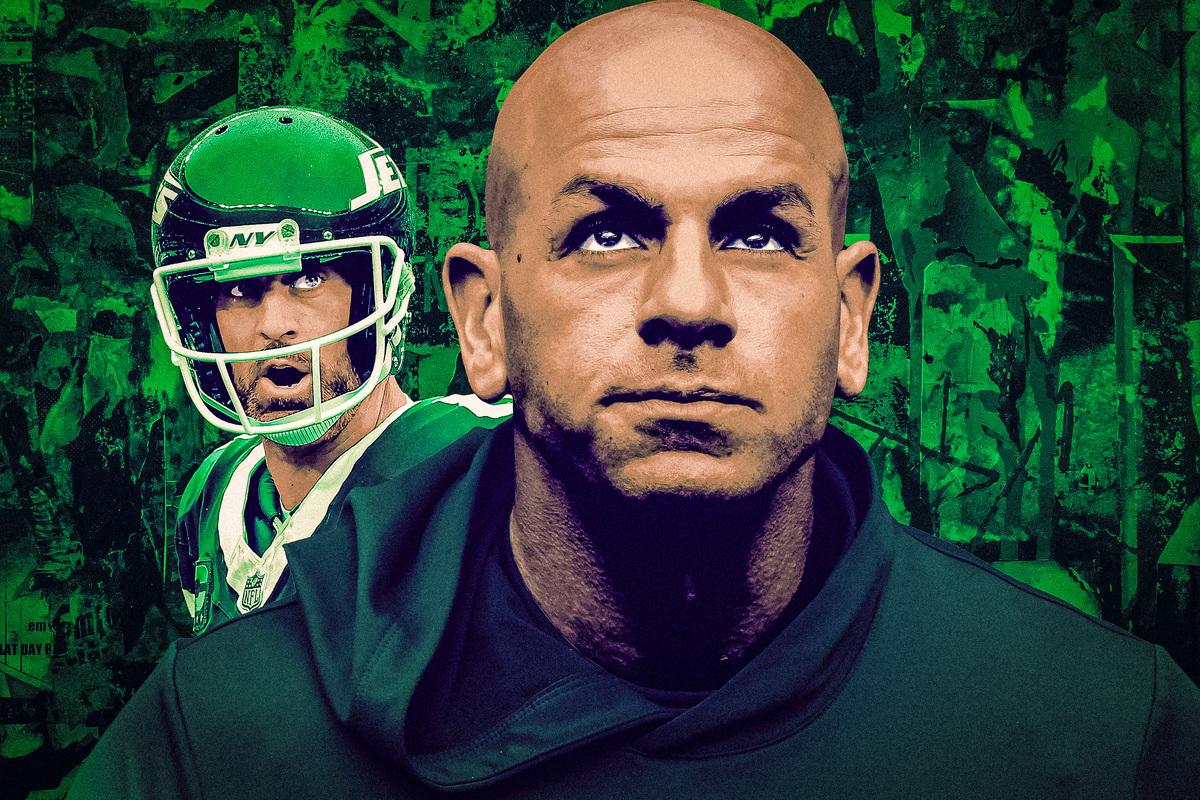
Here’s a thought exercise.
The New York Jets, sitting at 2-3 after their loss to the Minnesota Vikings in London last Sunday, will play the Bills, Steelers, Patriots, and Texans over the next month, with a 40-year-old quarterback who is nursing a low ankle sprain. Their offense, which is currently ranked 23rd by DVOA, 24th in expected points added per play, and 25th in points per game, will face defenses ranked eighth, ninth, 23rd, and 16th, respectively, by EPA per play allowed.
Where do you think the Jets will be a month from now? Do you think their offense will improve?
It’s a relevant question, not just because the Jets offense, and quarterback Aaron Rodgers in particular, has underperformed and needs to turn things around to stay competitive in the AFC, but because on Tuesday morning, team owner Woody Johnson made the surprise move to fire head coach Robert Saleh. Johnson explained his choice as one motivated by pressing need.
“This was not an easy decision, but we are not where we should be given our expectations, and I believe now is the best time for us to move in a different direction,” Johnson said in a statement.
Johnson also praised defensive coordinator Jeff Ulbrich, who will serve as interim head coach, saying that Ulbrich “can get the most out of our talented team and attain the goals we established this offseason.”
The combination of these largely boilerplate statements and the surprising timing of the move suggests that Saleh’s firing is intended as a shot in the arm to a team Johnson believes capable of more without Saleh than it currently is with him. And if that is the case, it’s a little tricky to follow Johnson’s logic.
It’s not that Saleh’s coaching tenure is beyond reproach—far from it. He’s 20-36 through three-plus seasons, and the Jets have had an offense that’s ranked in the bottom third of the league each year. He’s never had a winning season or made the playoffs, and his teams did not seem to improve year over year. It’s entirely reasonable, even typical, to fire a coach for results like that. But if firing Saleh is intended to make the Jets better right now, I question the premise. Because to the extent this is possible for a head coach, the reasons that the Jets have underperformed so far this season just don’t seem to have much to do with Saleh.
Saleh is a defensive-minded coach, and he performed so well as the 49ers’ defensive coordinator from 2017 to 2020 that he became one of the hottest head coaching candidates three years ago. The Jets didn’t hire him to be their DC specifically, but on that side of the ball, he has delivered.
Since Saleh has been their head coach, the Jets defense has ranked third in success rate, fourth in yards per play, and seventh in total defensive EPA. Yes, they’ve often been playing from behind, and therefore playing offenses that were just trying to protect a lead rather than be aggressive, but it also means Saleh’s defenses have been on the field a lot. The Jets defense has played the fourth-most snaps in the league since the start of the 2021 season. It’s hard to say that Saleh has done anything but a good, and maybe even great, job with the defense.
That’s continued to this season, in which the defense is 12th in DVOA and fourth in EPA per play, by both measures far outperforming the team’s offense.
Indeed, offense has been the problem throughout Saleh’s tenure, during which the Jets have ranked last—dead last—in the NFL in points per game and offensive EPA. You can explain away some of that because of the Zach Wilson (and Mike White and Joe Flacco and Trevor Siemian and Tim Boyle) of it all, but those struggles have continued this season under Rodgers.
The thing is, it has always seemed like Saleh’s involvement in the offense has been minimal, and that’s been especially true this season. Rodgers has a close relationship with offensive coordinator Nathaniel Hackett. And the offense they have chosen to run puts so much decision-making power on the quarterback’s shoulders that any coaching input is minimized.
The Jets offense is fairly static. They rank 24th in motion usage and 31st in play-action usage, according to Sports Info Solutions. Motion is a schematic tool featured in many of the NFL’s modern offenses to help players get open and create favorable matchups, but using motion frequently does reduce the amount of control a quarterback has at the line of scrimmage. Everything from the snap to faked handoffs is based on timing—not the quarterback’s own reading of the defense. Rodgers always has preferred to run a style of offense in which he is in control, and right now, the Jets are allowing him to do it.
The results, though, haven’t been great. For one, Rodgers hasn’t been good enough at seeing the field and deciphering defensive looks to justify giving up the easy buckets more motion or play-action tends to create. When blitzed, he ranks 29th among qualifying quarterbacks in EPA per dropback—not the result you want from a quarterback with his experience.
The Jets offense could really use some Easy Button plays. Rodgers’s style puts a lot of pressure on the offensive line, and that group has struggled, and because Rodgers isn’t currently dicing up those defenses he’s trying to read, New York is ending up in a lot of third-and-longs. On Sunday against the Vikings, the Jets averaged 3.6 yards per play on first and second downs—the lowest total of any team playing in Week 5. An offense that uses motion and play-action on early downs to stay ahead of the sticks might help the Jets mask one of their key weaknesses, but it’s not the kind of offense their quarterback or coordinator favors. It’s hard not to note that former offensive coordinator Mike LaFleur, a Saleh hire who left in 2023 to make way for Hackett, Rodgers’s preferred coach, is the type of OC who excels in this more modern style. According to CBS Sports, Saleh was reportedly considering firing Hackett as early as Tuesday, but Johnson fired Saleh first.
If the logical football underpinning for firing Saleh now isn’t there, then maybe it was a more impulsive, emotional decision. Johnson has never fired a coach in-season before—even Adam Gase got to coach out the year! According to multiple reports, Saleh was escorted out of the Jets’ building by the team’s director of security after Johnson delivered the news, which is not typical. That’s not the type of thing that seems to go with cool tempers, and this is the Jets, after all.
If Johnson fired Saleh in the heat of a moment—perhaps losing to Sam Darnold was just a bridge too far—it’s worth revisiting the question of where the Jets will be a month from now, once the dust has settled.
What reasons are there to believe they could be better off? Perhaps Rodgers and Saleh were at odds, and given Rodgers’s immense power within the organization, players were split on whose authority to respect. There have been multiple reports from sources intent on clarifying that Johnson alone fired Saleh and that the decision did not come at Rodgers’s behest, but the coach and the quarterback often seemed to have at least some degree of tension in their relationship. They had disagreements over Rodgers’s absence from minicamp this spring, whether he’d play in the preseason, and, most recently, the role his need for control at the line of scrimmage played in the team’s offensive struggles. There could be some value in removing that tension, and maybe Ulbrich and Rodgers will be able to lead a more united team.
If that doesn’t happen, though, then what? If a few games from now the Jets are still floundering around, at or below .500, underperforming for a team with Super Bowl aspirations, and Saleh is no longer around to take the blame? It’s hard to call Saleh a scapegoat, exactly—again, it’s really no big shock when a coach with a .357 winning percentage gets fired. But it does seem like he got the boot now not because he was the main source of the Jets’ problems but because he was the easiest to kick to the curb.
The two most powerful people in Jets leadership are Johnson and Rodgers, which didn’t bode well for Saleh’s long-term future in New York. Johnson’s brother, Christopher, hired Saleh when he was interim owner during his brother’s ambassadorship to the United Kingdom—and Rodgers has a long history of not exactly being an easy player to coach, but he also seems to hold as much power as any player ever has within an NFL organization.
So in that sense, minus a Super Bowl breakthrough, Saleh was always likely to get fired at some point. But where will the Jets be if they don’t get better without him? If they keep underperforming Johnson’s sky-high expectations, if the offense that Hackett and Rodgers are determined to run doesn’t suddenly improve, on the back of a 40-year-old quarterback with a bum ankle, against a stretch of good defenses?
Really, where they’ll be is exactly where they are right now, just with one fewer person to blame.

